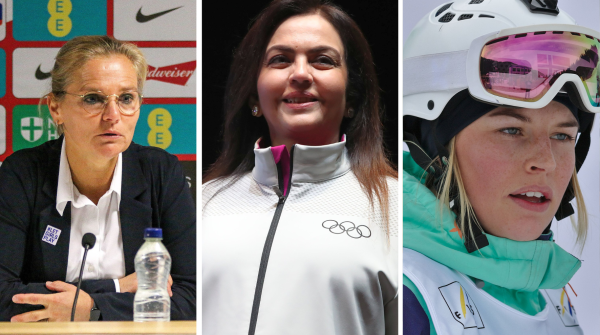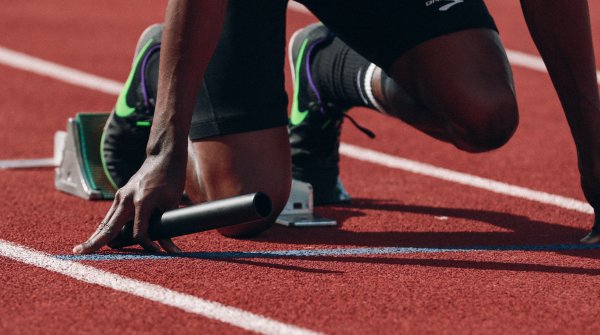
The first Olympic Games of modern times in Athens in 1896 were purely a male affair. Women were not wanted as participants in wrestling, army rifle shooting or one-armed weightlifting. Four years later in Paris, female athletes were allowed to serve in tennis and tee off in golf for the first time. But at 2.2 percent, their share remained manageable. And even in 1984 in Los Angeles, at 23 percent, not even one in four participants was a woman. That has changed dramatically since then. The Tokyo 2021 Summer Games was the first to go close to "gender-equal" Olympic Games in history. Nearly 49 percent of the 11,090 athletes were women.
2024 when returning to Paris, the International Olympic Committee (IOC) and the organizers are finally aiming for equality between male and female athletes. For all the criticism of the overly dictatorship-friendly IOC - when it comes to fairness between athletes, the Olympics are making good progress. "We have reduced the total number of athletes between Rio 2016 and Tokyo, and yet increased the number of female athletes," reveals IOC sports director Kit McConnell.

For the first time in the history of the Games, every country in Tokyo had female and male participants*n competing. In all five new sports - karate, skateboarding, sport climbing, surfing and 3x3 basketball - there were competitions for men and women. This made the Olympics more than ever the international sporting event where female athletes receive the most attention. The Summer and Winter Games are a model for all world sports, at least in this regard, according to Sarah Axelson. The vice president of the nonprofit Women's Sports Foundation praised ABC News<./span>: "In general, there is very little coverage of women's sports. And I think the Olympics are often the exception here."
In the super-macho sport of Formula 1, women were seen until a few years ago at best as lightly dressed "grid girls" in hot pants, who were allowed to hold up the signs with the names of the drivers on the starting grid. It's hard to believe that in more than 70 years of Formula 1 history since 1950, female drivers have not even won a single world championship point. Only the Italian Lella Lombardi has brought it in 1975 in an aborted race as sixth to a half (!) Point.
A female driver is also 2022 at the Grand Prix still not - despite talents like the Munich Sophia Flörsch. She continues to hope for her Formula 1 chance. And she reveals who still doesn't want to see female drivers in the cockpits. The 21-year-old to the Deutsche Welle: "It's the generation that already has white hair on their heads now. They come from a different time. There's this image of a hard, sweaty, fought-through race car driver who has to be a man. That can't change in their eyes." Because only 1.5 percent of all licensed motorsport drivers worldwide are female, it will probably be a long time before there is a "Michaela Schumacher," "Luisa Hamilton" or "Maximiliane Verstappen" world champion. After all: In the women's racing series "Formula W" is looking for young talent since 2019.
Besides the Formula 1 track, however, a lot is happening. The "We Race As One" campaign has been promoting diversity since 2020. Mercedes last raced a black car for two years - in support of the "Black Lives Matter" movement and at the express request of Lewis Hamilton. The Englishman is not only a seven-time world champion, but also the first top driver with "People of Color" skin color.
The German former world champion Sebastian Vettel consistently shows the rainbow symbol in the paddock - not always to the delight of the organizers, for example at the Hungarian GP in Budapest, where on a Vettel shirt was the inscription "Same Love". For this, the increasingly politically active Hessian received an official warning and got annoyed in the Orban state: "Somehow, some people seem to have a problem with it." Incidentally, the 2021 world champion was Red Bull driver Max Verstappen - directed by Hannah Schmitz, the team's chief strategist. The Brit, who has a degree in mechanical engineering, is the first woman to have been responsible for a Formula 1 world championship title in such a top position. She feels fully accepted in the racing circus: "By now, in terms of trust and respect, it's the same as if I were a man."

US football player Shaquem Griffin (26) emulates his twin brother Shaquill, who is an established star in the professional league NFL with the Jacksonville Jaguars and earns about 15 million dollars a year there. The key difference between the brothers is that Shaquem Griffin has only one hand. He was diagnosed with amniotic band syndrome at birth, which prevented the fingers on his left hand from fully developing. At age four, his pain became so severe that he tried to cut off his own hand with a knife. As a result, his parents had the hand amputated.
Football player and thus one of the few physically limited athletes in a major professional league became Shaquem Griffin anyway. The extremely fast linebacker, whose life story is currently being filmed, played in the NFL with the Seattle Seahawks and Miami Dolphins. Now he hopes to sign with the Jacksonville Jaguars, where he could then reunite with brother Shaquill. He is an ambassador for the #StareAtGreatness campaign, which is all about the fact that other people are perfectly allowed to "stare" when it comes to the achievements and accomplishments of people with disabilities. Motto of Shaquem Griffin: "It's about showing what we can do. You must never set limits for yourself."
The WNBA, the US professional women's basketball league, is considered a role model worldwide in terms of inclusion and diversity. The "Institute for Diversity and Ethics in Sport" (TIDES) again awarded the WNBA an overall A+ grade in 2021 for its treatment of skin color and gender. This marks the 17th consecutive year the league has secured at least an A rating. Expert Brooke Migdon speaks on the portal "Changing America"of a "near perfect score" for the league's personnel policies and handling of sociopolitical issues. For this, there were scores of 96.8 to 98.3 out of a maximum possible 100 points. This puts the WNBA ahead of all other U.S. professional leagues such as the men's NBA, ahead of soccer, baseball and soccer.
To receive an "A," at least 30 percent of a league's staff must be non-white, and at least 45 percent must be non-male. The WNBA easily exceeds those quotas - with 74.5 percent of players "of color," with five "people of color" head coaches now on staff, and with 61.3 percent of assistant coaches. Of 170 leading managers in the league, 84 are women. The men's league NBA can only dream of that - which most recently received grades between A and C.
Soccer is far from women's shares like in the WNBA. But here, too, movement is coming into play. FC Bayern's female soccer players last played in the Champions League quarterfinals against Paris Saint-Germain for the first time in the Allianz Arena, where Manuel Neuer, Thomas Müller & Co. usually kick. After all, 13,000 spectators came. Sports director Bianca Rech speaks of a Milestone: "The signal effect is of course immense. The Allianz Arena is a wonderful stage." In Spain, women's soccer has gone much further. Here the footballers of FC Barcelona have already sold out the legendary Camp Nou stadium with over 90,000 spectators twice in this Champions League season. Previously, only Lionel Messi & Co. have managed.
In the German Football Association there is since April 1 with Heike Ullrich for the first time a secretary general. And in the DFB Presidium sits from now on not only one woman - but five. The sports scientist Silke Sinning, one of the new presidium members, nevertheless knows: "The men's insistence system is very big." But women's desire for change is often even greater. Norway's Ada Hegerberg, one of the best female soccer players in the world, has just returned to the national team, from which she resigned in 2017 in protest at the national soccer federation's discrimination against women. Meanwhile, in Norway and Australia, female national players receive the same bonuses and payouts as their male counterparts - after all, they too have to be on the pitch for 90 minutes. Ada Hegerberg about perhaps the most important success of her career: "I'm happy that I can return to the team and start a new chapter with them."

2021 Summer Olympics with New Zealand weightlifter Laurel Hubbard for the first time, a trans athlete will be competing. "I am grateful for the kindness and support I have received from so many New Zealanders," the 43-year-old said. Die Number of LGBTQ+ athletes was higher than ever in Tokyo. And in the North American ice hockey league, the NHL, and in the football league, the NFL, two players, Luke Prokop and Carl Nassib, came out as gay for the first time in 2021.
"I just want to take a quick moment to say that I'm gay," Nassib explained in his Instagram video, which has since received nearly 800,000 likes. "I've been wanting to do this for a while, but now I finally feel comfortable enough to get it out." But a simple example from the outdoor sector in the U.S. shows just how much work remains to be done when it comes to diversity in sports activities. There, 78 percent of visitors to national parks are still white.
The Atlantic writes: "African Americans, Latinos, women, and members of the LGBTQ community often report feeling unwelcome or unsafe in the outdoors. Moreover, these groups are poorly represented in the outdoor industry, which ranges from park rangers to retail employees." But that's about to change, too, with the "Inclusive Outdoors Project". The initiative has set these goals: "Access for people with disabilities, access for people of color and queer communities, access to finances and to outdoor equipment. And the list goes on!"
- Awards
- Mountain sports
- Bike
- Fitness
- Health
- ISPO Munich
- Running
- Brands
- Sustainability
- Olympia
- OutDoor
- Promotion
- Sports Business
- Textrends
- Triathlon
- Water sports
- Winter sports
- eSports
- SportsTech
- OutDoor by ISPO
- Heroes
- Transformation
- Sport Fashion
- Urban Culture
- Challenges of a CEO
- Trade fairs
- Sports
- Find the Balance
- Product reviews
- Newsletter Exclusive Area
- Magazine






